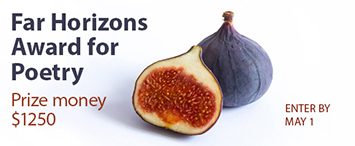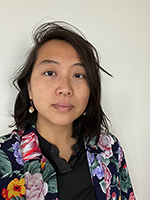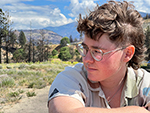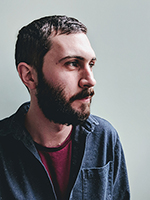|
|
Less than three weeks left!

Last chance to submit to this contest specifically for emerging poets. If you haven't yet published a book of poetry, our Far Horizons Award is for you.
This year's judge:
Patrick Grace
Read an interview with him to find out what he's looking for in a winning poem.
Entry fee (includes a one-year print subscription):
CAD $25 for each entry from Canada
CAD $35 for each entry from elsewhere
CAD $15 for each additional entry, no limit
Head over to our contest guidelines page to learn more.
Jody Chan,
Open Season Fiction Award winner
 Volunteer Karla Hirsch talks with the Open Season Fiction Award winner about abolitionist movements and how one’s principles, life, and fictions are indelibly intertwined. Volunteer Karla Hirsch talks with the Open Season Fiction Award winner about abolitionist movements and how one’s principles, life, and fictions are indelibly intertwined.
KH: I found all three of the mourners to have not only a distinct character, but their own language—which made this short piece even more dense and enduring. Could you talk a little about how you approached these three characters and their very individual forms and expressions of grief?
JC:
I embedded myself in the three characters’ very different relationships with Mei, and allowed the language of their grief to emerge from there. V’s grief, a moody spiral; Popo’s grief, a walk into the endless past; Ah Ma’s grief, a force field pushing outward.
I was trying not to be didactic (though, as the poet Solmaz Sharif says, there is a certain amount of telling involved in all writing, unless you assume a total sameness with the reader; and where does that instruction, not to be overtly instructive or principled or ideological, come from anyway?) and yet to have a really clear anti-carceral and abolitionist orientation to suicide and suicidality: to render suicide inside of its social and political contexts, and to take the utmost care I could with Mei’s life. It was important to me that none of the three characters would shame or pathologize Mei; regardless of the discomfort, heartbreak, lack of understanding, whatever, they might feel with regard to her choices. Grief, anger, hurt, disappointment, abandonment—yes, of course—but not shame, or accusation, or moralizing. All of this was informed by my own fraught relationship with suicidality, and by disability justice and abolitionist movements.
Read the rest of Jody Chan's interview.
Aldyn Chwelos, Open Season CNF Award winner
 Volunteer Kara Stanton talks with the Open Season CNF Award winner about symbolic containers and rewriting and reshaping our conceptions of ourselves. Volunteer Kara Stanton talks with the Open Season CNF Award winner about symbolic containers and rewriting and reshaping our conceptions of ourselves.
KS: This piece holds abundant quiet reflections on heteronormative gender roles, and the shapes we contort our bodies into to mold to each other. How did you navigate representing this highly gendered dynamic while pointing towards the ways in which it alternately comforts and chafes against the narrator?
AC:
I did worry in describing both these aspects that I’d be caught in a binary. As though the alternating, as you describe, between comfort and chafe were like two sides of a coin I was flipping and inevitably we’d land at either heads or tails. Neither of which would be true. The reality is much more molten and much harder to quantify.
The swans were a late addition. And I think they reflect not only the narrator’s self-consciousness in that moment but also my own self-consciousness at presenting that scene to an audience. The interesting thing is that once you’ve become attuned to those roles and dynamics, and the ways you’ve both willingly and unwillingly, knowingly and unknowingly, been shaped by them, then resistance itself can feel like a role you’re required to play. So to embrace both the comforts and chafes felt like embracing a failure of convention at multiple levels.
Read the rest of Aldyn Chwelos' interview.
Dominique Bernier-Cormier, Open Season Poetry Award winner
 Volunteer Christopher Sanford Beck talks with the Open Season Poetry Award winner about constantly rediscovering language and the universality of teenage (and human) experience. Volunteer Christopher Sanford Beck talks with the Open Season Poetry Award winner about constantly rediscovering language and the universality of teenage (and human) experience.
CSB: In your poem, the speaker talks about feeling connected to the weather, as if the state of their white T-shirt is connected to the skies. We know that our circles of impact are wider than we expect them to be, but at the same time, our experiences are deeply personal. As a poet, how do you balance specificity and personal authenticity with communal experiences?
DBC:
I think poetry, and especially metaphors, force us to link the personal and communal, to consider how individual elements affect the system. Every time you create a metaphor, you create a new ecosystem, a whole chain of relationships. If a T-shirt is the sky, then stains are weather, and if stains are weather, then smears of eyeliner are storm clouds, and so on. An extended metaphor is a food chain, a rain cycle. And it’s the same with the poem: every word you change affects the whole. There’s this video about the time they introduced a few individual wolves in Yellowstone, and over a few years it created a chain reaction that healed the whole ecosystem of the park. On hopeful days, that’s how I see the relationship between personal moments and communal experiences in poetry.
Read the rest of Dominique Bernier-Cormier's interview.
|
|
|
|
|
|
|
|
|
|
|
|